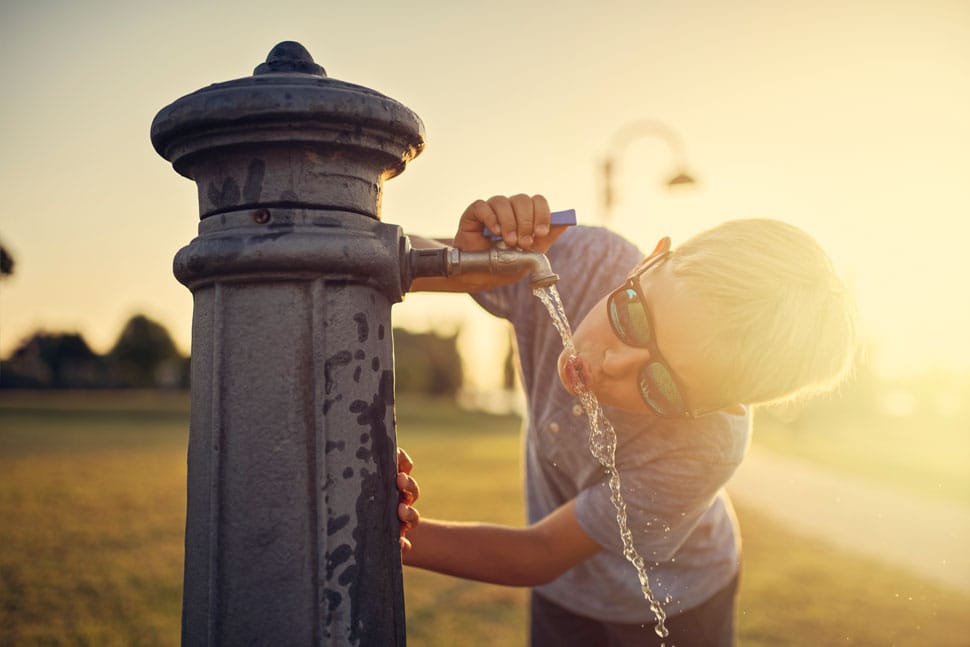Water is perhaps one of the world’s most important and life-affirming molecules. It’s often referred to as the “mickey mouse molecule” because of its chemical structure.
It has one large oxygen molecule in the center with two equidistant and smaller hydrogen molecules at a 108-degree angle.
The entire structure looks like the world’s most popular cartoon character — the oxygen molecule forms the face, and the hydrogen molecules form the little ears. Water also happens to be as central to life as Mickey Mouse is to Disney — life wouldn’t exist without it.
After all, the adult human body is 60% water, and the earth is 71% water. There’s no life without water, that’s obvious. And all of us, at some point, have experienced what it’s like to go without water. Perhaps you didn’t have access to water for a while as you were traveling. Maybe you engaged in some physical exercises that had you sweating out all the water. Whatever the situation may have been, we all know, intrinsically, that going without water would be hell.
Common Symptoms of Dehydration
If your body doesn’t have enough water, you start experiencing the signs and symptoms of dehydration. Depending on how little water you have, the symptoms of dehydration can be as mild as thirst to bodily collapse and fainting.
The following are the most common symptoms of dehydration, in ascending order of severity:
- Initially, you experience general thirst with a desire to drink water.
- Soon, your mouth starts feeling sticky and dry. Not a pleasant sensation.
- You can’t take a leak, even though it feels like you really want to.
- You have a burning sensation, and you feel an immense need to take a leak.
- Your urine, the little that you produce, is dark yellow. The burning sensation doesn’t go away.
- Soon, you realize your skin feels cool and dry.
- A headache soon takes hold, throbbing within your head.
- Your muscles start cramping.
- While your skin was already dry, it now seems parched and flaky.
- The splitting headache paves the way for dizziness, and you feel the world revolves around you.
- Your heartbeat speeds, drumming against your chest rapidly.
- You breathe rapidly as if you could inhale moisture through the air.
- Your eyes are sunken.
- The lack of energy in your body makes you feel sleepy.
- You’re confused and irritable.
- You faint and lose consciousness.
Benefits of Drinking Water
To avoid the aforementioned symptoms of dehydration, you must drink plenty of water and keep your body hydrated. You should ideally drink at least eight 8-ounce glasses of water per day. This figure isn’t based on hard-and-fast science, but rather a general rule.
Different people have different hydration requirements. If you work out a lot, for example, you may need to go way beyond that recommended level.
The following are some of the key benefits of drinking water:
- Drinking water and staying hydrated allows you to continue with physical activities, especially since you lose 6 to 10% of your water weight through sweat, and you only need to lose 2% for dehydration to set in.
- According to studies, losing 1.4% of water affects mood and concentration. As such, remaining hydrated allows you to concentrate and work efficiently.
- Drinking more water helps you avoid headaches and migraines.
- Low water consumption often leads to constipation. However, drinking mineral water with magnesium and sodium improves digestion and helps avoid constipation.
- Drinking plenty of water before, during, and after drinking can also help you avoid hangovers, which usually occurs because alcohol is a diuretic that makes you lose water.
These are just some of the many benefits of water. It wouldn’t be hyperbolic to say that drinking plenty of water benefits every aspect of your life and body. So, drink up!


